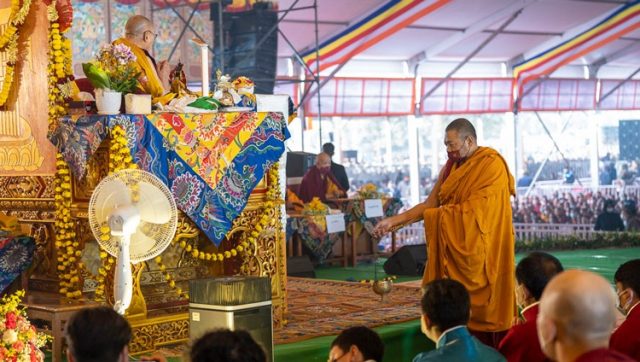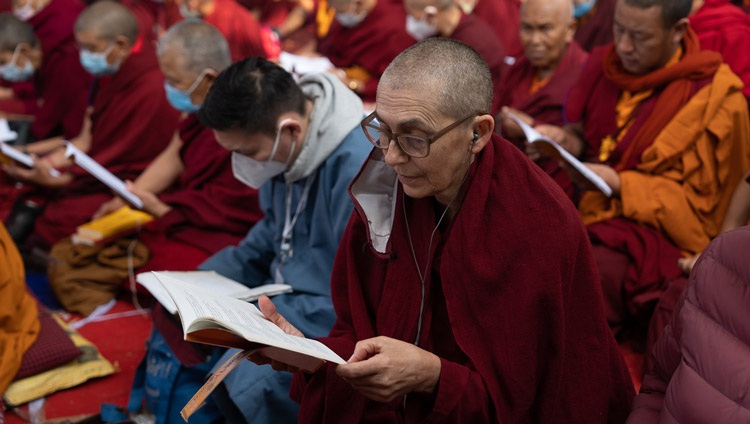
His Holiness the Dalai Lama performing preparatory rites to giving the permission of 21 Taras on the third day of teachings at the Kalachakra Teaching Ground in Bodhgaya, Bihar, India on December 31, 2022. Photo by Tenzin Choejor
Bodhgaya — This morning at the Kalachakra Ground, as soon as His Holiness the Dalai Lama had taken his seat, a group of monastics and lay-people began to chant the ‘Heart Sutra’ in Chinese. Tea and bread were served and the day’s patrons offered a mandala and the threefold representation of the body, speech and mind of enlightenment to His Holiness.
“Here, on behalf of this great gathering of people,” His Holiness declared, “I’ve been requested to give a permission related to Arya Tara. As I have already made clear, this is a special place and the most important thing we can do here is to generate bodhichitta, aspiring to achieve full enlightenment in the interest of self and others. This is how we can make our lives meaningful.
“Tibetans have been cultivating bodhichitta since the time of the religious kings when Shantarakshita was invited to Tibet. If your mind is relaxed and at peace, as a result of developing the awakening mind of bodhichitta, you’ll find you enjoy good physical health and sound sleep. You’ll be happy day and night.
“Today, I’m going to give the permission of the 21 Taras, which is found in the Rinjung Gyatsa and Sukha Gyatsa collections. I received the Rinjung Gyatsa from Tagdag Rinpoché in Tibet among many other empowerments and transmissions. I don’t remember receiving the Sukha Gyatsa from him, but Kyabjé Trijang Rinpoché gave it to me later, after we’d come into exile.
“While I go through the preparatory rites, please pray to Arya Tara that the Dharma may flourish, that people may be well and that teachers and those gathered here may live long. Keep in mind that the longer you live, the greater will be your opportunity to accumulate merit. What’s more, since Avalokiteshvara sits on the crown of my head, you all share a special bond with him, which means you’ll be cared for him in life after life.”
As he began to formally give the permission, His Holiness instructed the disciples to make a request for the teaching. He noted that he had given a general introduction to the Dharma over the last two days. He also acknowledged that Tibetans, Mongolians, Chinese and people from the Himalayan regions have been practising the Dharma for generations and consequently share a karmic connection.
To start with the disciples were to request the bodhisattva vows. His Holiness advised them to visualize the Buddha in the space before them accompanied by Arhats, the Eight Bodhisattvas: Mañjushri, Avalokiteshvara, Vajrapani, Maitreya, Kshitigarbha, Akashagarbha, Sarvanivaranavishkambhini and Samantabhadra, as well as great Indian masters represented by the Six Ornaments: Nagarjuna, Aryadeva, Asanga, Vasubandhu, Dignaga and Dharmakirti and the Two Supremes: Gunaprabha and Shakyaprabha.
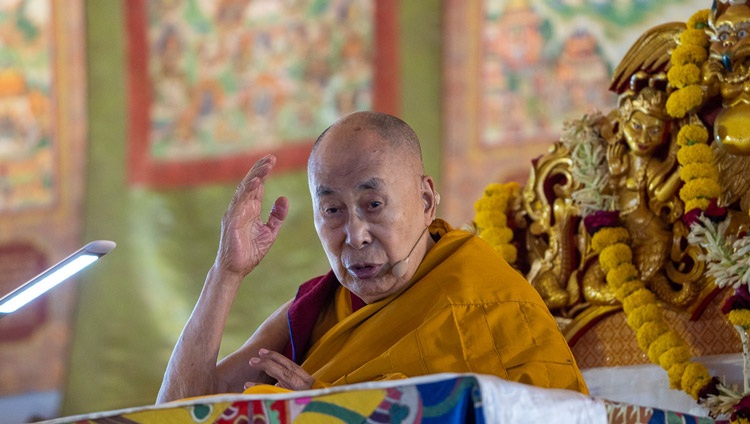
His Holiness the Dalai Lama addressing the crowd on the third day of teachings at the Kalachakra Teaching Ground in Bodhgaya, Bihar, India on December 31, 2022. Photo by Tenzin Choejor
His Holiness then led the congregation in reciting verses for taking the Bodhisattva Vows three times.
I take refuge in the Three Jewels,
Individually disclose all my unwholesome deeds,
Rejoice in the virtues of all beings and
Mentally take up the enlightenment of a Buddha.
Until I am enlightened, I take refuge in the
Buddha, the Dharma and the Supreme Assembly.
I generate the spirit of enlightenment
to fully attain my own and others’ welfare.
Having generated the spirit of supreme enlightenment
I invite all sentient beings as my guests,
And engage in the supreme and wonderful conduct of a Bodhisattva.
May I attain Buddhahood to benefit all wandering beings.
Next, the disciples were to request the body of Arya Tara. His Holiness confirmed that he had visualized himself and the front-generated deity in that form and recited a description of the 21 Taras with their colours and attributes as follows:
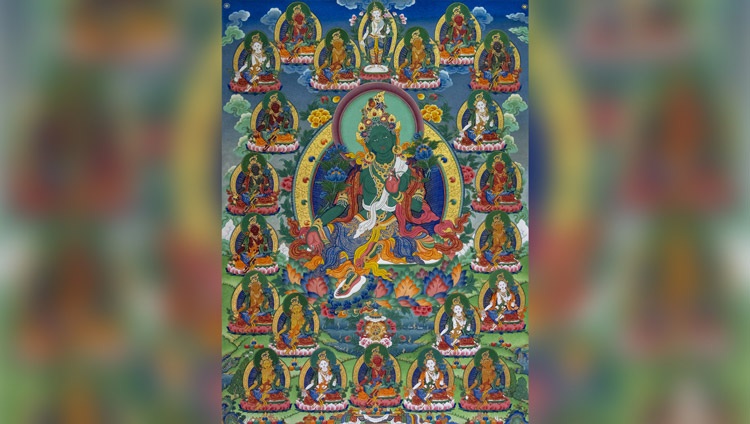
Depiction of the 21 Taras that accords with the textual description starting at the bottom, with the red Tara, and proceeding clockwise.
(1) Tara who is swift and heroic—red in colour, right hand in the gesture of bestowing sublime attainments, holding a red vase of subjugation.
(2) Tara of immense peace—white in colour like the moon in autumn—right hand in the gesture of bestowing sublime attainments, holding a white vase that pacifies disease and negative forces.
(3) Tara of a golden colour—right hand in the gesture of bestowing sublime attainments, holding a yellow vase that increases lifespan and merit.
(4) Tara (of life) who is golden in colour—right hand in the gesture of bestowing sublime attainments, holding a yellow vase that extends life.
(5) On a sun disc sits Tara who utters the sound [HUM]—orange in colour, right hand in the gesture of bestowing sublime attainments, holding an enchanting (orange) vase.
(6) On a sun disc sits Tara who is victorious over the three worlds—dark red in colour, right hand in the gesture of bestowing sublime attainments, holding a (dark red) vase that befuddles evil spirits.
(7) On a sun disc sits Tara who averts the spells of others—black in colour and slightly wrathful, right hand in the gesture of bestowing sublime attainments, holding a (black) vase that counters the spells of mantras.
(8) On a sun disc sits Tara who conquers evil forces—dark red in colour, right hand in the gesture of bestowing sublime attainments, holding a (dark red) vase that overcomes enemies.
(9) Tara who symbolizes the Three Jewels—white in colour, right hand in the gesture of bestowing sublime attainments, holding a (white) vase that protects from fears.
(10) Tara who conquers maras and subjugates the world—red in colour, right hand in the gesture of bestowing sublime attainments, holding in her outstretched palm a (red) vase that conquers maras and subjugated.
(11) Tara who invokes (the guardians of the ten directions and so forth) and rescues from poverty—orange in colour, resembling refined gold, right hand in the gesture of bestowing sublime attainments, holding in her outstretched palm a (red) vase that protects from poverty.
(12) Tara who brings good fortune—orange in colour, right hand in the gesture of bestowing sublime attainments, holding an (orange) vase that brings good fortune.
(13) Tara of blazing fire—red in colour, right hand in the gesture of bestowing sublime attainments, holding a (red) vase that overcomes enemies.
(14) On a sun disc sits frowning Tara—black in colour and frowning slightly, right hand in the gesture of bestowing sublime attainments, holding a (black) vase that pierces obstructers.
(15) Tara of great peace—white in colour, right hand in the gesture of bestowing sublime attainments, holding a (white) vase that pacifies negative actions.
(16) Tara who liberates through the HUM of knowledge—red in colour, right hand in the gesture of bestowing sublime attainments, holding a (red) vase that spreads knowledge mantras.
(17) Tara who moves the world—orange in colour, right hand in the gesture of bestowing sublime attainments, holding an (orange) vase that subdues knowledge mantras.
(18) Tara who pacifies and removes sicknesses due to poison—white in colour, right hand in the gesture of bestowing sublime attainments, holding a (white) vase that removes sicknesses due to poison.
(19) Tara who eliminates disputes and bad dreams—white in colour, right hand in the gesture of bestowing sublime attainments, holding a (white) vase that removes disputes and bad dreams.
(20) Tara who eliminates epidemics—orange in colour, right hand in the gesture of bestowing sublime attainments, holding an (orange) vase that eliminates epidemics.
(21) Tara of enlightened activities—white in colour, right hand in the gesture of bestowing sublime attainments, holding a (white) vase that accomplishes different enlightened activities.
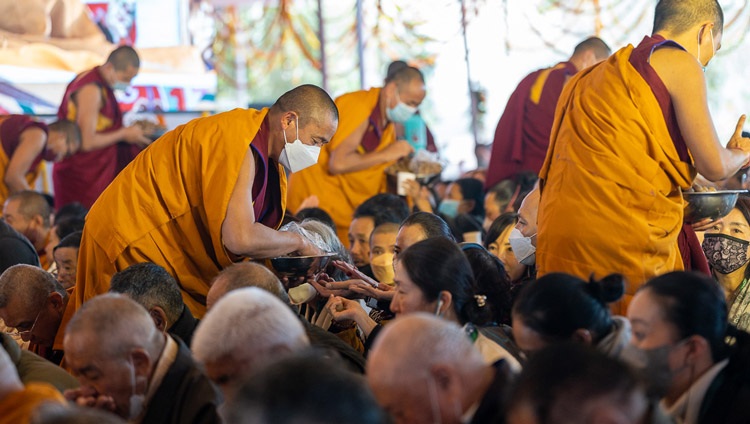
Monks distributing ritual pills to members of the audience during the permission of 21 Taras on the third day of His Holiness the Dalai Lama’s teachings at the Kalachakra Teaching Ground in Bodhgaya, Bihar, India on December 31, 2022. Photo by Tenzin Choejor
All these Taras have one face and two hands, the left of which is in the gesture of giving refuge and holds the stem of an utpala (a blue lotus) flower. They are (mostly) peaceful and smile enchantingly. They wear silken garments, are adorned with a variety of jewels, and (most of them) are seated on moon disc seats. They meditate with their legs in the bodhisattva position (which is to say, right leg slightly extended and left bent inward).
Next, the disciples requested the speech of Tara, the mind of Tara and the blessing of the mantra. The ritual concluded with the offering of a thanksgiving mandala.
His Holiness resumed his reading of Nagarjuna’s ‘Commentary on the Awakening Mind’ from verse 67 commenting that we need to overcome clinging to true existence. He added that unless we can overcome the obstructions to knowledge, we’ll be unable to attain enlightenment.
When practitioners see sentient beings overwhelmed by karma and mental afflictions, they recognize that these obstructions can be eliminated from the mind. They reflect that they can help sentient beings do this and resolve to do so to repay the kindness they have received. As verse 105 makes clear, ‘the awakening mind is stated to be the highest ideal of the great vehicle, so with a determined effort generate this awakening mind.’ His Holiness read to the end of the text, including the colophon.
“We have gathered here in this sacred place where the Buddha became enlightened and which was later blessed by the presence of Nagarjuna and others,” he observed. “We are doing our best to become closer to all of them by fulfilling their instructions. Now, please dedicate whatever merit has been created for the benefit of all beings.”
The discourse ended with a recitation of the prayer that concludes Tsongkhapa’s ‘Great Treatise on the Stages of the Path’ that includes the following verse:
Wherever the Buddha’s teaching has not spread
And wherever it has spread but has declined
May I, moved by great compassion, clearly elucidate
This treasury of excellent benefit and happiness for all.
Before His Holiness left the stage and the congregation dispersed, Jamphel Lhundrup, Secretary of the Dalai Lama Trust that organized these teachings gave an account in Tibetan of the income and expenses involved in the event. He thanked His Holiness for his teaching and expressed gratitude to local officials for all their support. Zumchung Tashi then repeated the summary in English.
As has become his custom, His Holiness came to the front of the stage to wave to the crowd and then paid his respects to the most senior Lamas before boarding the golfcart to return to Gaden Phelgyeling Monastery, smiling and waving to well-wishers on the way.


